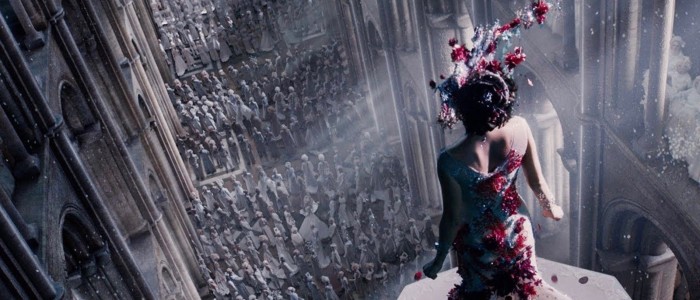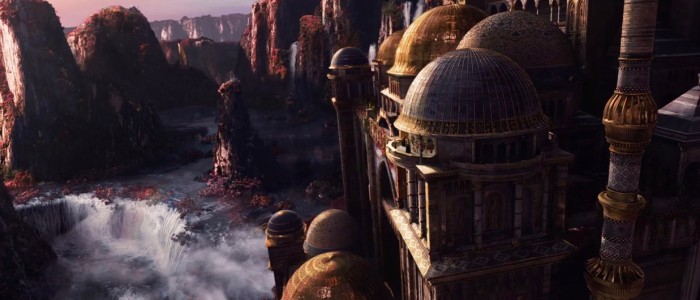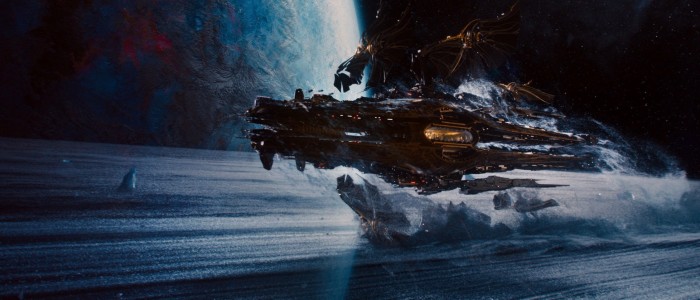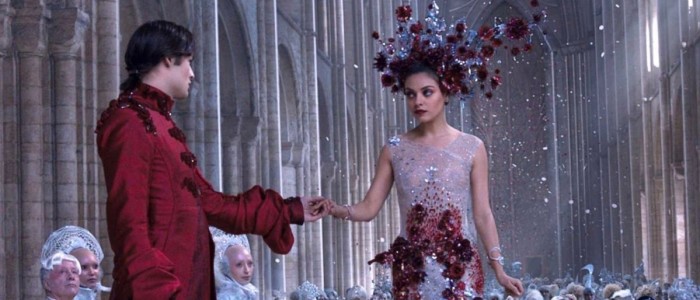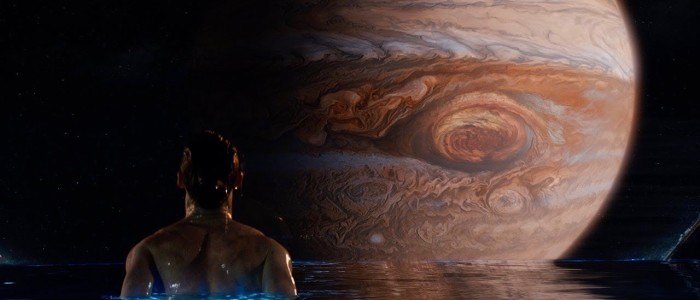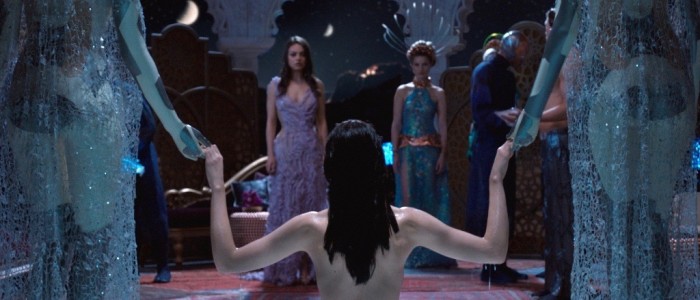The Unpopular Opinion: 'Jupiter Ascending' Is The Gorgeous, Big-Hearted Antidote To Cynical Science Fiction
(Welcome to The Unpopular Opinion, a series where a writer goes to the defense of a much-maligned film or sets their sights on a movie seemingly beloved by all. In this edition: why the failure of Valerian the City of a Thousand Planets allows it to join the club of overlooked space fantasy that already includes the magnificent Jupiter Ascending.)
I saw Valerian and the City of a Thousand Planets last week in a practically empty theater, and I left with a smile on my face. Once again Luc Besson gave us a fully immersive, beautiful universe, a romantic fantasy quest in an extraterrestrial setting, with a powerful message similar to that of The Fifth Element: Love conquers all. Inspired by the French comic books by writer Pierre Christin and artist Jean-Claude Mézières, Luc Besson took us on a welcome journey to somewhere colorful and hopeful, welcome in a year filled with darker sci-fi tales like Life and Alien: Covenant. And yet, no one saw Valerian. It is destined to join the ranks of movies that we discuss for their financial failures instead of their successes.
One close cousin to Valerian is the Wachowski's delightful 2015 space opera, Jupiter Ascending. Perhaps the reason I so enjoyed Valerian was because I also happen to be a part of another small group that adored this visionary take on a space fairy tale starring Mila Kunis and Channing Tatum. Admittedly, my love for Jupiter Ascending was a bit of a slow burn. It wasn't until I went to bed the night after watching it that I realized how wonderful it really was. The more times I watched it, the more my love grew. It's the kind of movie that I imagine watching with my future children and yet, I rarely ever get to talk to people who actually went to see it or have bothered to rent it. However when I do find someone who is part of this club, we have conversations built of pure joy and enthusiasm.
In a period of filmmaking obsessed with sequels and remakes, Jupiter Ascending is something completely original. It is not an adaptation, it has nothing to do with aliens versus humans, and their is no looming sense of total dread and darkness. This is a film completely from the hearts of the Wachowskis, blending science fiction with themes straight out of children's fairy tales, and told with some of the most stunning visual designs this side of the asteroid belt.
Science Fantasy
When you scan the sections at Barnes & Noble, there is a 'Romance,' section, there is an overall 'Fiction,' section, and then there is "Science Fiction/Fantasy." Science Fiction and Fantasy are synonymous, literary blood relatives. However, as science has caught up to science-fiction, science-fiction has lost it's fantasy. Space landscapes that feel as fantastical as Rivendell from Lord of the Rings feel more and more rare.
Enter Jupiter Ascending, a welcome return to the whimsical. The Wachowskis returned that feeling of wonder and awe from the 'new-fronteir' era of science-fiction. With Elon Musk revolutionizing rockets, and the commercialization and privatization of space travel, science-fiction films like The Martian, Gravity, and Passengers feel more like they fit in that general 'real world' fiction category than they do science fiction. There still exists a certain amount of the fantastic in those films, but that bewilderment and curiosity has more to do with things pertaining to real science and the capabilities of man than it does the feeling of magic and the impossible. Although Jupiter Ascending offers a grounding point in the life of immigrants in Chicago, there is literally no attempt to be realistic whatsoever in the execution of its story. And I love it.
Lana Wachowski sees the universe as being as infinite as the imagination: "If you can imagine it, the universe can probably imagine it too." There should be nothing holding you back in terms of creating a space opera, no adherence to any base knowledge of science. In the same way that you can watch Harry Potter and be grounded in the real world and just accept that there is a whole other magical world existing around us, you should be able to lend the same acceptance to the gene splicing, gravity boots, and time-harvesting of Jupiter Ascending. The Wachowskis are here to remind us to not get so hung up on the 'science' part of 'science fiction,' and instead explore space through the same eyes you use to explore magic.
Fairytales and Fables
In interviews pertaining to Jupiter Ascending, the Wachowskis discuss their life long love of Alice in Wonderland and Wizard of Oz. If The Matrix was showing us "just how far this rabbit hole goes," Jupiter Ascending is showing us that "there's no place like home." Jupiter is taken away from her humdrum life, where she has no sense of purpose and no means for escape, and thrust into this magical and often scary universe. Much like Dorothy and her daydreaming about what is over the rainbow, Jupiter is constantly ignoring her housecleaning duties in order to play make believe in the upperclass homes she is paid to scrub.
Keeping with the age old mantra of "be careful what you wish for," Jupiter, like Dorothy and Alice before her, is yanked into a world that defies everything she thought she knew. As the story goes off-planet, Jupiter's epic quest leads her to find out who she is, what she is capable of, and what her purpose is. However, when she is faced with fleeing her old life for the gripping adventure and royal status that she was destined for, she instead takes what she has come to know of herself and returns to her humdrum life with a refreshing new outlook and an understanding that she didn't have before. She is no longer stuck, she knows exactly how she can escape, and sometimes it just takes knowing that you are capable of more to change your life.
The Wachowskis talk about Jupiter as being akin to the heroines of old fairy stories. She is a hero that never uses violence, except when defending herself against Balem Abrasax in the final battle. Making something action-packed was not their focus. Rather, their focus was on having a very human story in a very surreal setting. As Lilly Wachowski (who was still credited as Andy at the time of filming) discussed in a behind-the-scenes interview for Jupiter Ascending, science fiction was a way to discuss heavy human ideas, like politics and religion, under the guise of something extravagant and entertaining. Jupiter Ascending, as she puts it, is a sort of religious story for the non-religious, tying in themes not only of "who am I?" and "are we alone?" but of reincarnation and class. Jupiter Ascending is a science fiction/fantasy movie with a very human message, a strong moral backbone, and an open-minded, humanist bent. It's a fable for the 21st century.
A World Where Spaceships Aren't So Damn Ugly
Where Jupiter Ascending may have hiccups in the execution of its sometimes-too-ambitious story, its visuals are flawless. Watching Titus' ship rise up through a planets rings, with its fins reminiscent of some beautiful deep sea creature, is watching pure beauty torn from the minds of two visionaries. In making Jupiter Ascending, Lana Wachowski spoke passionately about how she can't understand why spaceships are just "so damn ugly." Whether Star Wars or The Martian, a lot of science fiction takes place in practical or government vessels of some form or fashion. In Jupiter Ascending, the spaceships reflect the personalities of their users.
The Wachowskis put so much emphasis on the compounds and vessels of the three Abrasax siblings, that the film becomes a Lifetyles of the Rich And Famous episode in space. Taking influence from everything from cathedrals and castles to the landscapes of Iceland, no detail was lost when it came to fully realizing these grandiose images. Even if I'm crazy for loving this movie, go back and watch it and just try to remember the last time you saw science fantasy like this.
Beyond the set pieces, Jupiter Ascending pays close attention to wardrobe. Jupiter's stunning crystal headpiece and gown for her wedding ceremony with Titus stuck with me long after seeing the movie, and not just because that marriage raised all kinds of Oedipal red flags. Even the outfits for the 'sims' that acted as wedding guests or the ladies-in-waiting for both Kalique and Titus Abrasax are beautifully rendered, even as they exist in the background. The scope of the film's artistry cannot be fully appreciated until your second or third viewing because there is just so much to take in. It's overwhelming.
The creatures of Jupiter Ascending are as varied and unique as the costumes and spaceships. In the universe created by the Wachowskis, Earth is not the birth place of the human race, but instead merely a colony. Outside of Earth, humans have mastered "splicing." Caine, Channing Tatum's half-wolf character, is one such splice, while Sean Bean is genetically part bee. With the Wachowski's completely open-ended fantasy take on science fiction, they had the option to fully create new alien species that had nothing to do with humans. Instead, they create dozens of "spliced" creatures, all with fascinating looks and behaviors. That requires a lot of finesse and a great deal of creativity in its own right. From Sean Bean's hexagonal pupils and the texture of Channing Tatum's facial hair to the winged-lizard-human hybrids that act as the flying monkeys to Eddie Redmayne's Wicked Witch, the creature designs balance walk a tightrope between the real and the unreal.
No Apologies
I am not denying Jupiter Ascending's flaws. It had to grow on me. The movie itself feels more like a selection of chapters from a much longer novel, like a collection of disconnected adventures from an unpublished book. Although there is a clear beginning and a clear final battle and resolution, the middle of the film almost feels like a video game, complete with side quests and sub-bosses, each with their own beginnings. middles, and ends. This structure (not to mention the Oedipal complexes present throughout the story), can be a little jarring when you don't expect it.
However, I couldn't stop thinking about Jupiter Ascending for the rest of the day after I saw it. Not only because it was absolutely stunning and I enjoyed the heart of the story, but because I almost felt guilty for not liking it at first. It was as if someone was pouring their heart out to you in a language you didn't understand, I realized that the fault of my initial viewing of Jupiter Ascending was that it had been so long since I have had to suspend reality to that extent that I just couldn't understand what the Wachowskis were saying to me. They set out to show us something that we have never seen before, but we have become so accustomed to familiar that we can no longer speak their language or be bothered to learn it.
Lana Wachowski once said, "There were tons of movies that made a lot of money and were utterly and completely forgotten. Likewise, there were movies that didn't make any money that are still around and are still important." Will Jupiter Ascending be important? I don't know. But I'm still thinking (and writing) about it years later.
Movies like Jupiter Ascending and Valerian may or may not end up being "important" films, but they will be loved. Both films will not get their due in at the box office number, but they are shining reminders of what science fantasy looks like when you don't package it as a franchise: a blend of wonder and social commentary on a magnificent scale. Where love and kindness and honor, the pillars of humanity (however you chose to define that word), can still hold steady through the most mind-bending and monumental of conflicts.
The Wachowskis and Luc Besson both reference their childhoods when discussing the creation of the universes in their films, whether it was Besson's love of the original french comics or the Wachowski's love of the Wizard of Oz and Alice in Wonderland. Jupiter Ascending reminds me more of The Neverending Story and Labyrinth – unapologetic fantasy for romantics. That doesn't sell tickets, but it sure does win hearts.

